Advanced Practice Nurses: Education, Roles, and Impact on Healthcare
VerifiedAdded on 2021/06/17
|7
|1885
|31
Essay
AI Summary
This essay provides a comprehensive overview of Advanced Practice Nurses (APNs), emphasizing their pivotal role in healthcare. APNs, including nurse midwives, nurse anesthetists, nurse practitioners, and clinical nurse specialists, are key providers of preventive care and diagnose and treat illnesses. They possess advanced education, typically a Master's degree, enabling them to make critical decisions and specialize in areas like women's health or anesthesia. The essay details their diverse functions, from performing physical exams and ordering tests to counseling patients and dispensing medications. It also outlines the educational journey to become an APN, including a Bachelor's degree, RN license, and a Master's program. The essay highlights the four main types of APNs: certified nurse midwives, certified registered nurse anesthetists, clinical nurse specialists, and nurse practitioners, each with distinct roles and responsibilities. The essay emphasizes the APNs' expanded roles, including patient management, collaboration, and prescriptive authority. The essay concludes by providing a list of references used to support the information.
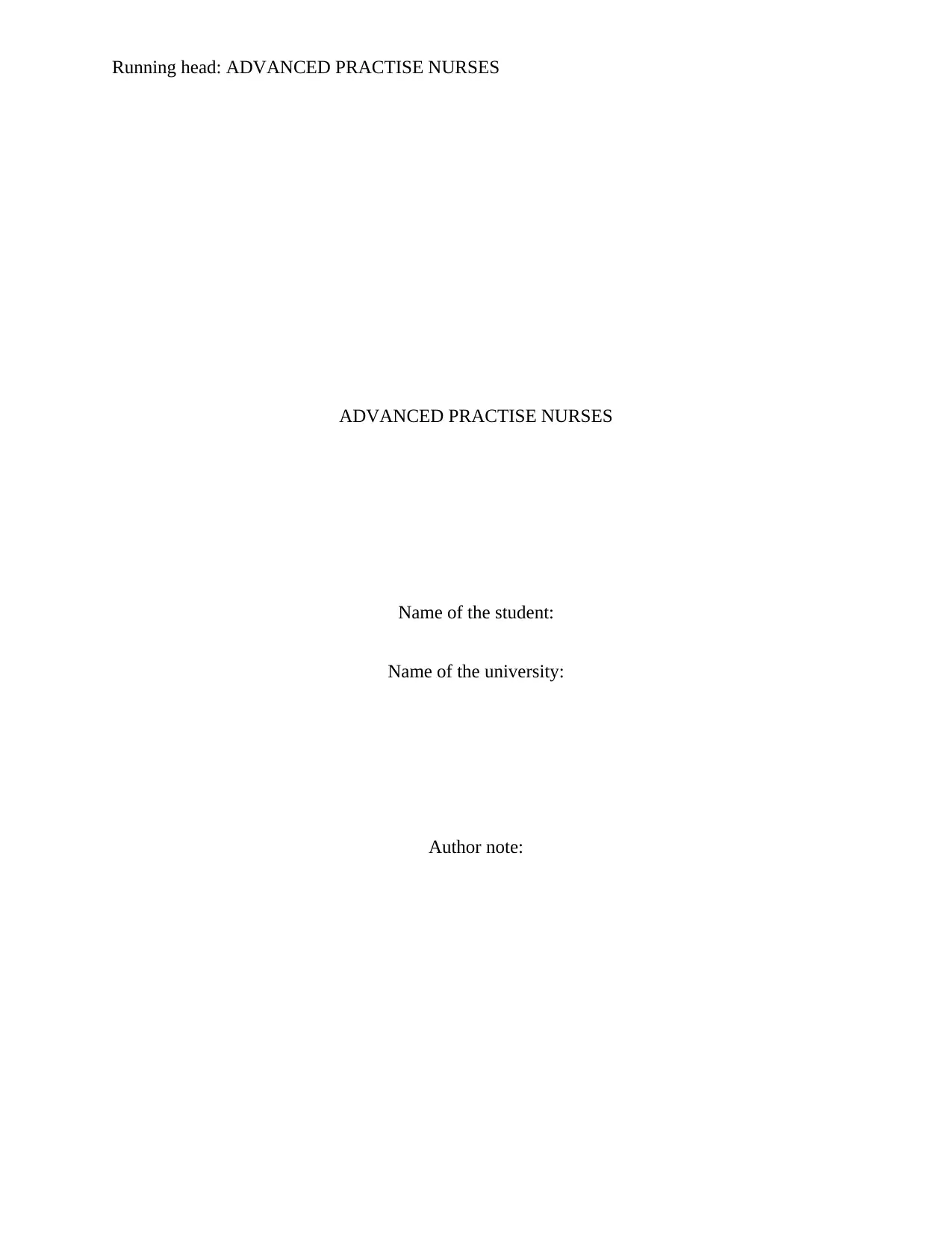
Running head: ADVANCED PRACTISE NURSES
ADVANCED PRACTISE NURSES
Name of the student:
Name of the university:
Author note:
ADVANCED PRACTISE NURSES
Name of the student:
Name of the university:
Author note:
Paraphrase This Document
Need a fresh take? Get an instant paraphrase of this document with our AI Paraphraser
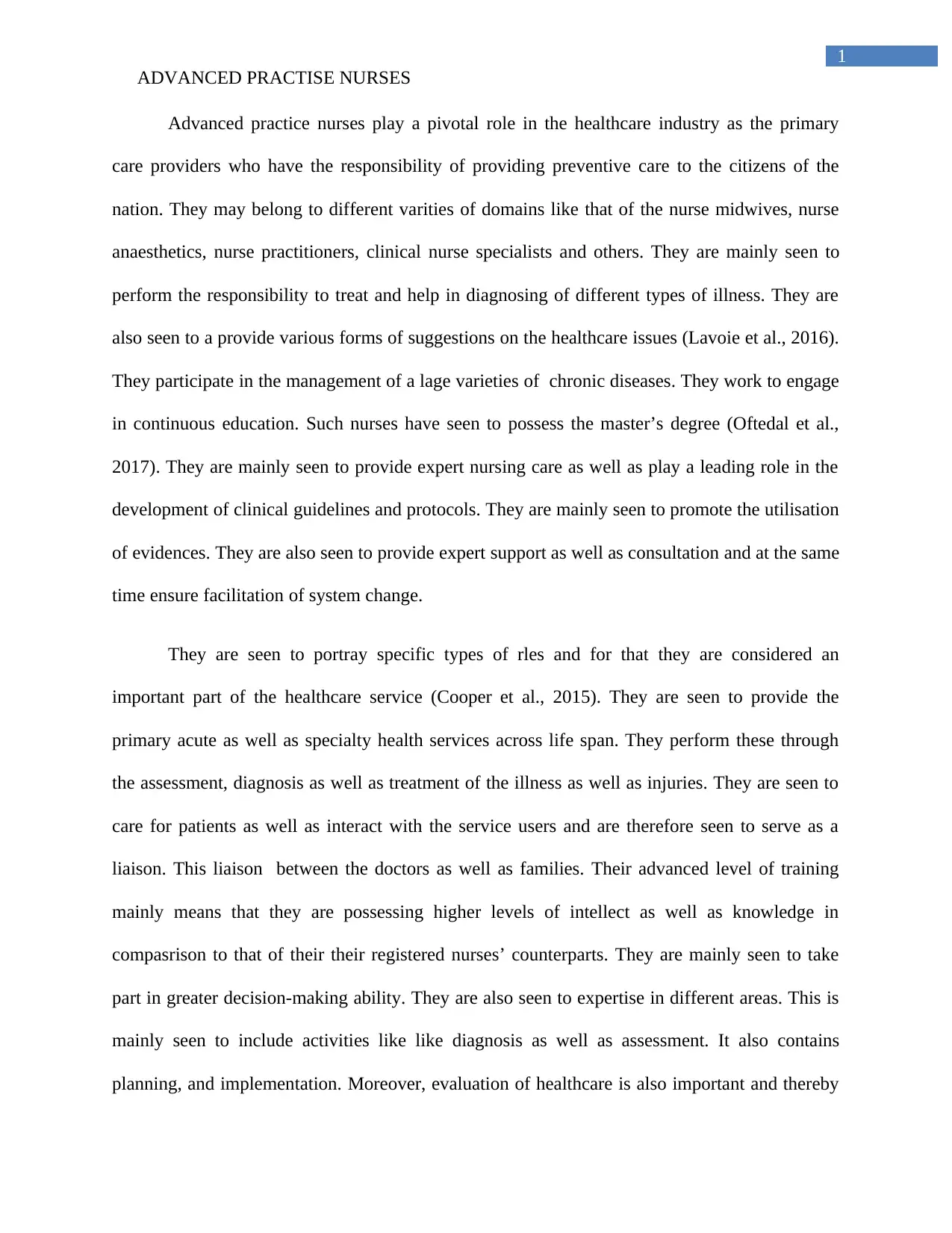
1
ADVANCED PRACTISE NURSES
Advanced practice nurses play a pivotal role in the healthcare industry as the primary
care providers who have the responsibility of providing preventive care to the citizens of the
nation. They may belong to different varities of domains like that of the nurse midwives, nurse
anaesthetics, nurse practitioners, clinical nurse specialists and others. They are mainly seen to
perform the responsibility to treat and help in diagnosing of different types of illness. They are
also seen to a provide various forms of suggestions on the healthcare issues (Lavoie et al., 2016).
They participate in the management of a lage varieties of chronic diseases. They work to engage
in continuous education. Such nurses have seen to possess the master’s degree (Oftedal et al.,
2017). They are mainly seen to provide expert nursing care as well as play a leading role in the
development of clinical guidelines and protocols. They are mainly seen to promote the utilisation
of evidences. They are also seen to provide expert support as well as consultation and at the same
time ensure facilitation of system change.
They are seen to portray specific types of rles and for that they are considered an
important part of the healthcare service (Cooper et al., 2015). They are seen to provide the
primary acute as well as specialty health services across life span. They perform these through
the assessment, diagnosis as well as treatment of the illness as well as injuries. They are seen to
care for patients as well as interact with the service users and are therefore seen to serve as a
liaison. This liaison between the doctors as well as families. Their advanced level of training
mainly means that they are possessing higher levels of intellect as well as knowledge in
compasrison to that of their their registered nurses’ counterparts. They are mainly seen to take
part in greater decision-making ability. They are also seen to expertise in different areas. This is
mainly seen to include activities like like diagnosis as well as assessment. It also contains
planning, and implementation. Moreover, evaluation of healthcare is also important and thereby
ADVANCED PRACTISE NURSES
Advanced practice nurses play a pivotal role in the healthcare industry as the primary
care providers who have the responsibility of providing preventive care to the citizens of the
nation. They may belong to different varities of domains like that of the nurse midwives, nurse
anaesthetics, nurse practitioners, clinical nurse specialists and others. They are mainly seen to
perform the responsibility to treat and help in diagnosing of different types of illness. They are
also seen to a provide various forms of suggestions on the healthcare issues (Lavoie et al., 2016).
They participate in the management of a lage varieties of chronic diseases. They work to engage
in continuous education. Such nurses have seen to possess the master’s degree (Oftedal et al.,
2017). They are mainly seen to provide expert nursing care as well as play a leading role in the
development of clinical guidelines and protocols. They are mainly seen to promote the utilisation
of evidences. They are also seen to provide expert support as well as consultation and at the same
time ensure facilitation of system change.
They are seen to portray specific types of rles and for that they are considered an
important part of the healthcare service (Cooper et al., 2015). They are seen to provide the
primary acute as well as specialty health services across life span. They perform these through
the assessment, diagnosis as well as treatment of the illness as well as injuries. They are seen to
care for patients as well as interact with the service users and are therefore seen to serve as a
liaison. This liaison between the doctors as well as families. Their advanced level of training
mainly means that they are possessing higher levels of intellect as well as knowledge in
compasrison to that of their their registered nurses’ counterparts. They are mainly seen to take
part in greater decision-making ability. They are also seen to expertise in different areas. This is
mainly seen to include activities like like diagnosis as well as assessment. It also contains
planning, and implementation. Moreover, evaluation of healthcare is also important and thereby
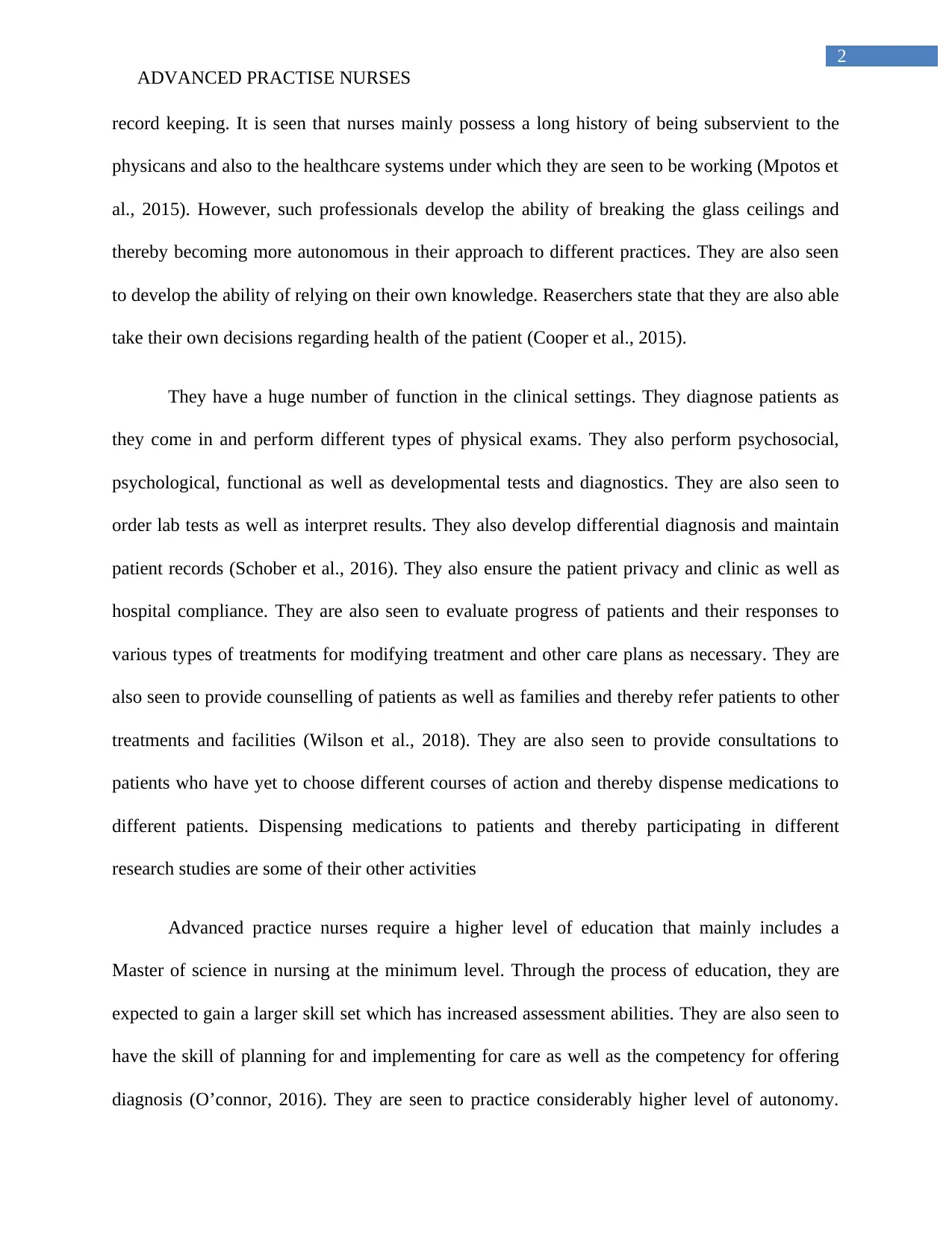
2
ADVANCED PRACTISE NURSES
record keeping. It is seen that nurses mainly possess a long history of being subservient to the
physicans and also to the healthcare systems under which they are seen to be working (Mpotos et
al., 2015). However, such professionals develop the ability of breaking the glass ceilings and
thereby becoming more autonomous in their approach to different practices. They are also seen
to develop the ability of relying on their own knowledge. Reaserchers state that they are also able
take their own decisions regarding health of the patient (Cooper et al., 2015).
They have a huge number of function in the clinical settings. They diagnose patients as
they come in and perform different types of physical exams. They also perform psychosocial,
psychological, functional as well as developmental tests and diagnostics. They are also seen to
order lab tests as well as interpret results. They also develop differential diagnosis and maintain
patient records (Schober et al., 2016). They also ensure the patient privacy and clinic as well as
hospital compliance. They are also seen to evaluate progress of patients and their responses to
various types of treatments for modifying treatment and other care plans as necessary. They are
also seen to provide counselling of patients as well as families and thereby refer patients to other
treatments and facilities (Wilson et al., 2018). They are also seen to provide consultations to
patients who have yet to choose different courses of action and thereby dispense medications to
different patients. Dispensing medications to patients and thereby participating in different
research studies are some of their other activities
Advanced practice nurses require a higher level of education that mainly includes a
Master of science in nursing at the minimum level. Through the process of education, they are
expected to gain a larger skill set which has increased assessment abilities. They are also seen to
have the skill of planning for and implementing for care as well as the competency for offering
diagnosis (O’connor, 2016). They are seen to practice considerably higher level of autonomy.
ADVANCED PRACTISE NURSES
record keeping. It is seen that nurses mainly possess a long history of being subservient to the
physicans and also to the healthcare systems under which they are seen to be working (Mpotos et
al., 2015). However, such professionals develop the ability of breaking the glass ceilings and
thereby becoming more autonomous in their approach to different practices. They are also seen
to develop the ability of relying on their own knowledge. Reaserchers state that they are also able
take their own decisions regarding health of the patient (Cooper et al., 2015).
They have a huge number of function in the clinical settings. They diagnose patients as
they come in and perform different types of physical exams. They also perform psychosocial,
psychological, functional as well as developmental tests and diagnostics. They are also seen to
order lab tests as well as interpret results. They also develop differential diagnosis and maintain
patient records (Schober et al., 2016). They also ensure the patient privacy and clinic as well as
hospital compliance. They are also seen to evaluate progress of patients and their responses to
various types of treatments for modifying treatment and other care plans as necessary. They are
also seen to provide counselling of patients as well as families and thereby refer patients to other
treatments and facilities (Wilson et al., 2018). They are also seen to provide consultations to
patients who have yet to choose different courses of action and thereby dispense medications to
different patients. Dispensing medications to patients and thereby participating in different
research studies are some of their other activities
Advanced practice nurses require a higher level of education that mainly includes a
Master of science in nursing at the minimum level. Through the process of education, they are
expected to gain a larger skill set which has increased assessment abilities. They are also seen to
have the skill of planning for and implementing for care as well as the competency for offering
diagnosis (O’connor, 2016). They are seen to practice considerably higher level of autonomy.
⊘ This is a preview!⊘
Do you want full access?
Subscribe today to unlock all pages.

Trusted by 1+ million students worldwide
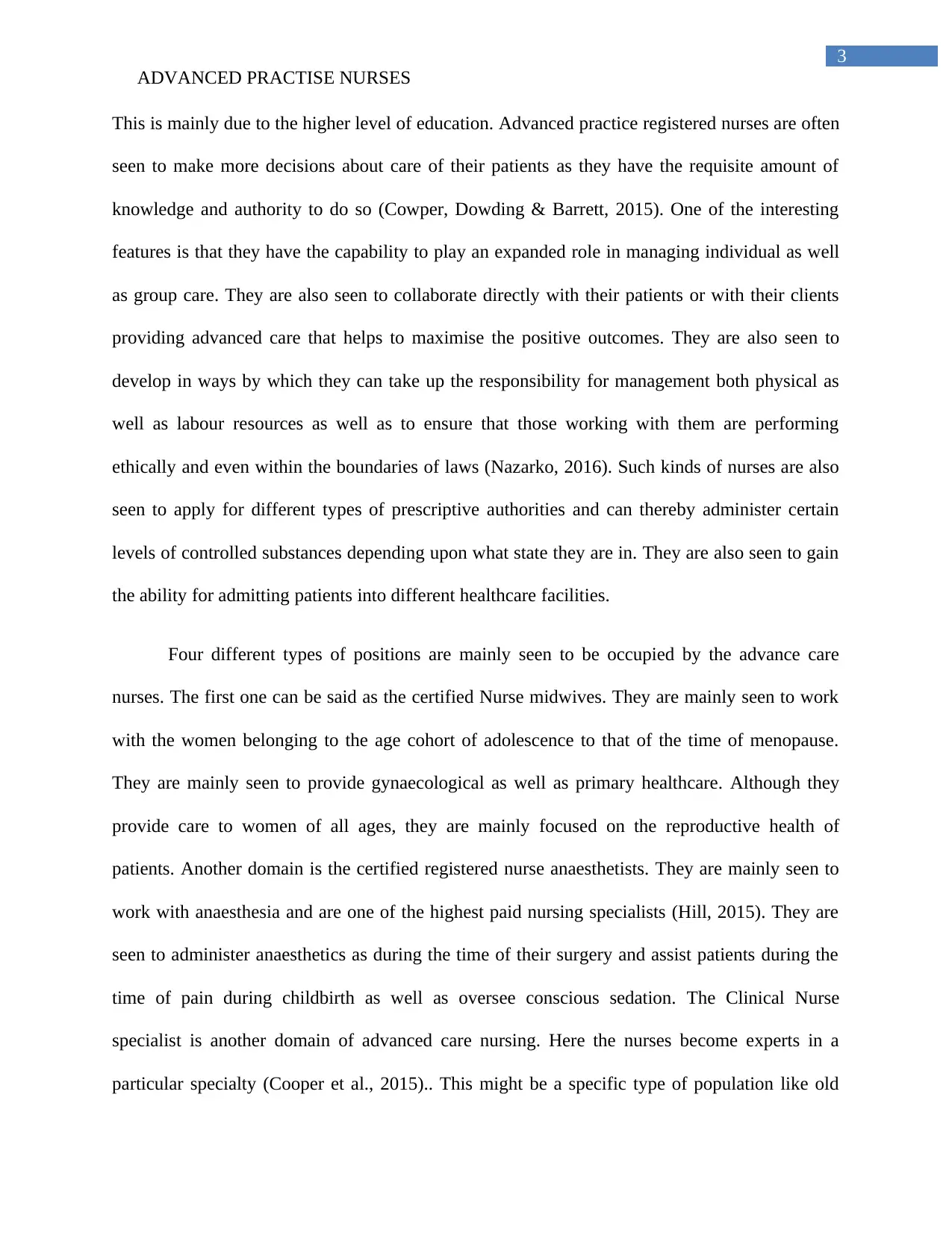
3
ADVANCED PRACTISE NURSES
This is mainly due to the higher level of education. Advanced practice registered nurses are often
seen to make more decisions about care of their patients as they have the requisite amount of
knowledge and authority to do so (Cowper, Dowding & Barrett, 2015). One of the interesting
features is that they have the capability to play an expanded role in managing individual as well
as group care. They are also seen to collaborate directly with their patients or with their clients
providing advanced care that helps to maximise the positive outcomes. They are also seen to
develop in ways by which they can take up the responsibility for management both physical as
well as labour resources as well as to ensure that those working with them are performing
ethically and even within the boundaries of laws (Nazarko, 2016). Such kinds of nurses are also
seen to apply for different types of prescriptive authorities and can thereby administer certain
levels of controlled substances depending upon what state they are in. They are also seen to gain
the ability for admitting patients into different healthcare facilities.
Four different types of positions are mainly seen to be occupied by the advance care
nurses. The first one can be said as the certified Nurse midwives. They are mainly seen to work
with the women belonging to the age cohort of adolescence to that of the time of menopause.
They are mainly seen to provide gynaecological as well as primary healthcare. Although they
provide care to women of all ages, they are mainly focused on the reproductive health of
patients. Another domain is the certified registered nurse anaesthetists. They are mainly seen to
work with anaesthesia and are one of the highest paid nursing specialists (Hill, 2015). They are
seen to administer anaesthetics as during the time of their surgery and assist patients during the
time of pain during childbirth as well as oversee conscious sedation. The Clinical Nurse
specialist is another domain of advanced care nursing. Here the nurses become experts in a
particular specialty (Cooper et al., 2015).. This might be a specific type of population like old
ADVANCED PRACTISE NURSES
This is mainly due to the higher level of education. Advanced practice registered nurses are often
seen to make more decisions about care of their patients as they have the requisite amount of
knowledge and authority to do so (Cowper, Dowding & Barrett, 2015). One of the interesting
features is that they have the capability to play an expanded role in managing individual as well
as group care. They are also seen to collaborate directly with their patients or with their clients
providing advanced care that helps to maximise the positive outcomes. They are also seen to
develop in ways by which they can take up the responsibility for management both physical as
well as labour resources as well as to ensure that those working with them are performing
ethically and even within the boundaries of laws (Nazarko, 2016). Such kinds of nurses are also
seen to apply for different types of prescriptive authorities and can thereby administer certain
levels of controlled substances depending upon what state they are in. They are also seen to gain
the ability for admitting patients into different healthcare facilities.
Four different types of positions are mainly seen to be occupied by the advance care
nurses. The first one can be said as the certified Nurse midwives. They are mainly seen to work
with the women belonging to the age cohort of adolescence to that of the time of menopause.
They are mainly seen to provide gynaecological as well as primary healthcare. Although they
provide care to women of all ages, they are mainly focused on the reproductive health of
patients. Another domain is the certified registered nurse anaesthetists. They are mainly seen to
work with anaesthesia and are one of the highest paid nursing specialists (Hill, 2015). They are
seen to administer anaesthetics as during the time of their surgery and assist patients during the
time of pain during childbirth as well as oversee conscious sedation. The Clinical Nurse
specialist is another domain of advanced care nursing. Here the nurses become experts in a
particular specialty (Cooper et al., 2015).. This might be a specific type of population like old
Paraphrase This Document
Need a fresh take? Get an instant paraphrase of this document with our AI Paraphraser
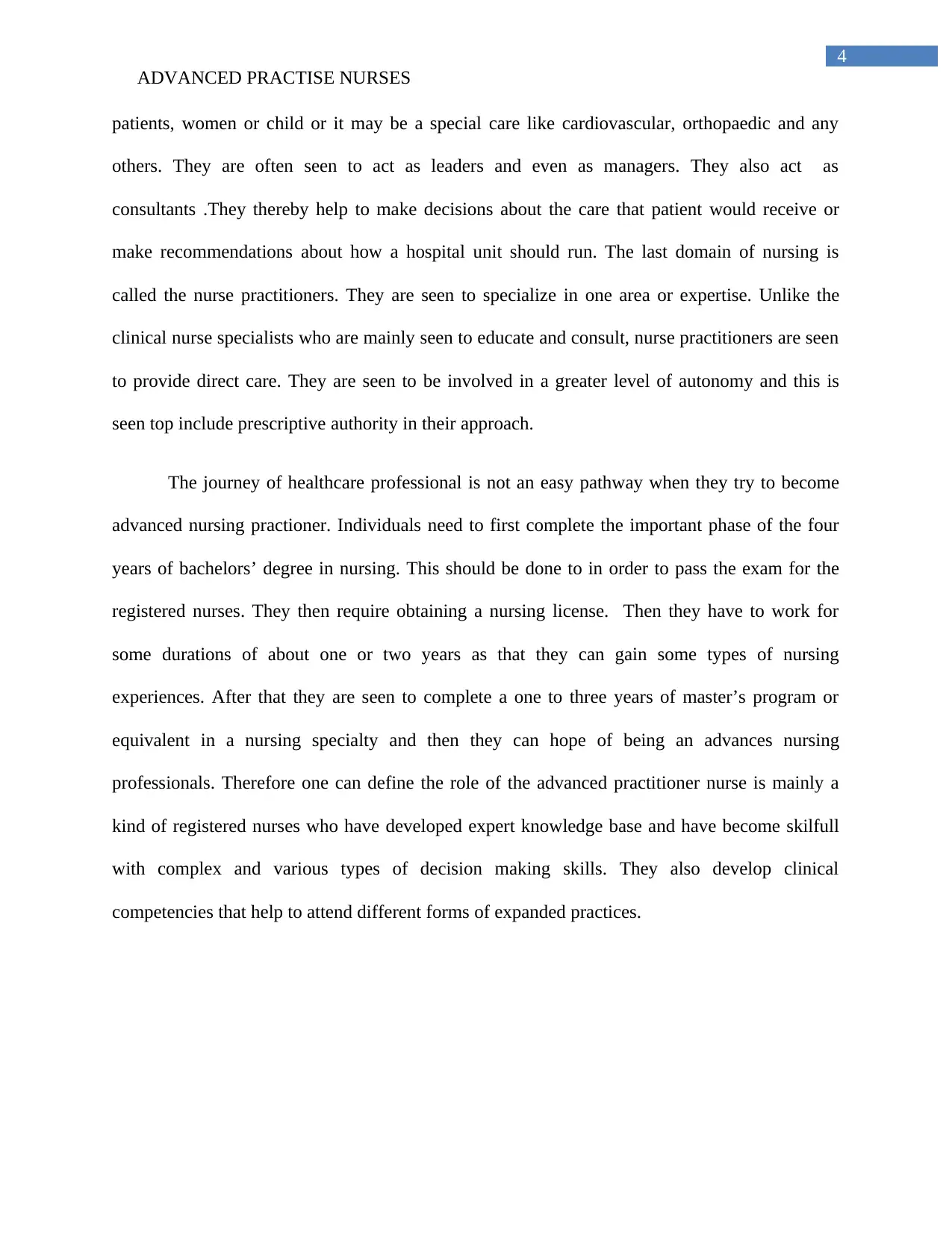
4
ADVANCED PRACTISE NURSES
patients, women or child or it may be a special care like cardiovascular, orthopaedic and any
others. They are often seen to act as leaders and even as managers. They also act as
consultants .They thereby help to make decisions about the care that patient would receive or
make recommendations about how a hospital unit should run. The last domain of nursing is
called the nurse practitioners. They are seen to specialize in one area or expertise. Unlike the
clinical nurse specialists who are mainly seen to educate and consult, nurse practitioners are seen
to provide direct care. They are seen to be involved in a greater level of autonomy and this is
seen top include prescriptive authority in their approach.
The journey of healthcare professional is not an easy pathway when they try to become
advanced nursing practioner. Individuals need to first complete the important phase of the four
years of bachelors’ degree in nursing. This should be done to in order to pass the exam for the
registered nurses. They then require obtaining a nursing license. Then they have to work for
some durations of about one or two years as that they can gain some types of nursing
experiences. After that they are seen to complete a one to three years of master’s program or
equivalent in a nursing specialty and then they can hope of being an advances nursing
professionals. Therefore one can define the role of the advanced practitioner nurse is mainly a
kind of registered nurses who have developed expert knowledge base and have become skilfull
with complex and various types of decision making skills. They also develop clinical
competencies that help to attend different forms of expanded practices.
ADVANCED PRACTISE NURSES
patients, women or child or it may be a special care like cardiovascular, orthopaedic and any
others. They are often seen to act as leaders and even as managers. They also act as
consultants .They thereby help to make decisions about the care that patient would receive or
make recommendations about how a hospital unit should run. The last domain of nursing is
called the nurse practitioners. They are seen to specialize in one area or expertise. Unlike the
clinical nurse specialists who are mainly seen to educate and consult, nurse practitioners are seen
to provide direct care. They are seen to be involved in a greater level of autonomy and this is
seen top include prescriptive authority in their approach.
The journey of healthcare professional is not an easy pathway when they try to become
advanced nursing practioner. Individuals need to first complete the important phase of the four
years of bachelors’ degree in nursing. This should be done to in order to pass the exam for the
registered nurses. They then require obtaining a nursing license. Then they have to work for
some durations of about one or two years as that they can gain some types of nursing
experiences. After that they are seen to complete a one to three years of master’s program or
equivalent in a nursing specialty and then they can hope of being an advances nursing
professionals. Therefore one can define the role of the advanced practitioner nurse is mainly a
kind of registered nurses who have developed expert knowledge base and have become skilfull
with complex and various types of decision making skills. They also develop clinical
competencies that help to attend different forms of expanded practices.
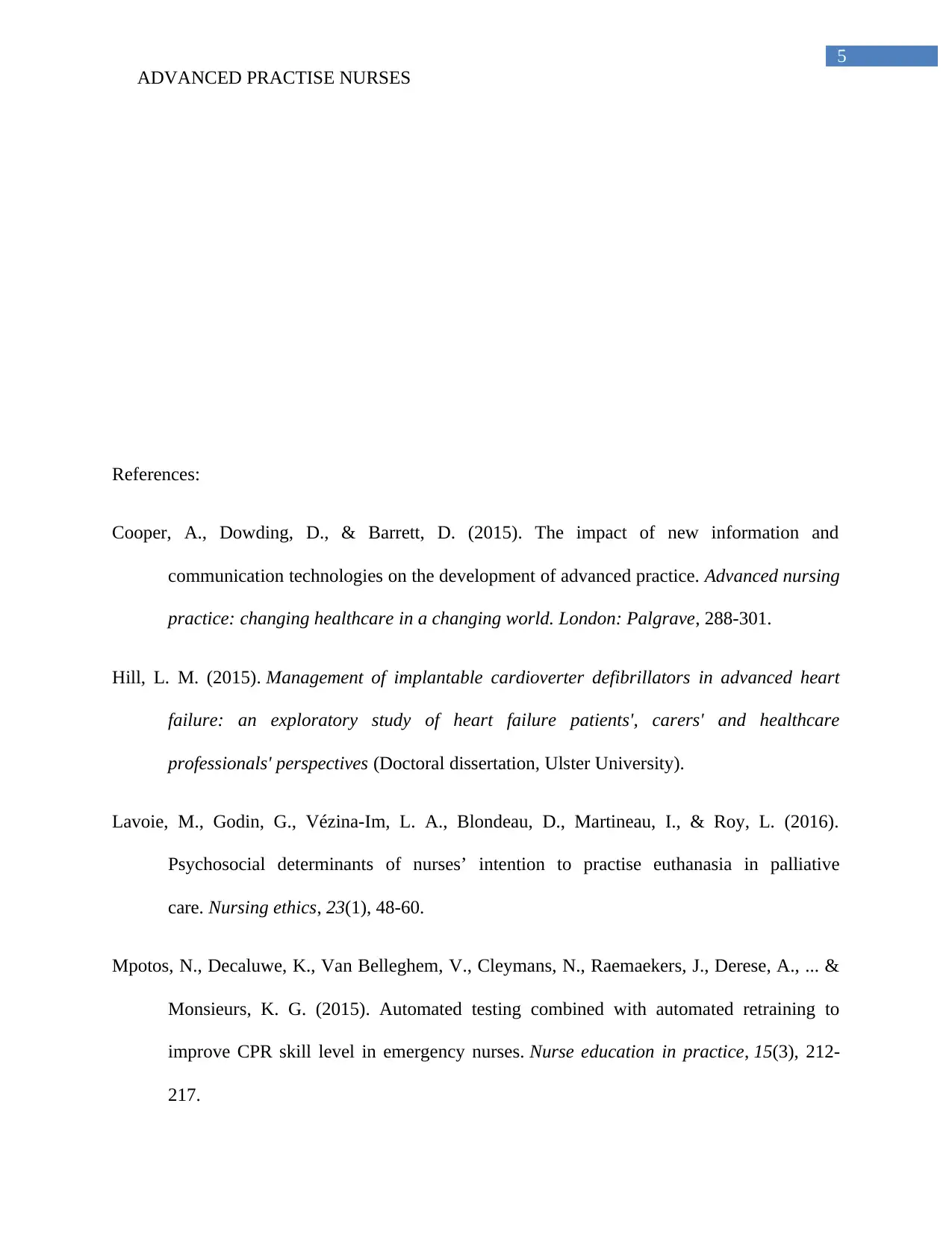
5
ADVANCED PRACTISE NURSES
References:
Cooper, A., Dowding, D., & Barrett, D. (2015). The impact of new information and
communication technologies on the development of advanced practice. Advanced nursing
practice: changing healthcare in a changing world. London: Palgrave, 288-301.
Hill, L. M. (2015). Management of implantable cardioverter defibrillators in advanced heart
failure: an exploratory study of heart failure patients', carers' and healthcare
professionals' perspectives (Doctoral dissertation, Ulster University).
Lavoie, M., Godin, G., Vézina-Im, L. A., Blondeau, D., Martineau, I., & Roy, L. (2016).
Psychosocial determinants of nurses’ intention to practise euthanasia in palliative
care. Nursing ethics, 23(1), 48-60.
Mpotos, N., Decaluwe, K., Van Belleghem, V., Cleymans, N., Raemaekers, J., Derese, A., ... &
Monsieurs, K. G. (2015). Automated testing combined with automated retraining to
improve CPR skill level in emergency nurses. Nurse education in practice, 15(3), 212-
217.
ADVANCED PRACTISE NURSES
References:
Cooper, A., Dowding, D., & Barrett, D. (2015). The impact of new information and
communication technologies on the development of advanced practice. Advanced nursing
practice: changing healthcare in a changing world. London: Palgrave, 288-301.
Hill, L. M. (2015). Management of implantable cardioverter defibrillators in advanced heart
failure: an exploratory study of heart failure patients', carers' and healthcare
professionals' perspectives (Doctoral dissertation, Ulster University).
Lavoie, M., Godin, G., Vézina-Im, L. A., Blondeau, D., Martineau, I., & Roy, L. (2016).
Psychosocial determinants of nurses’ intention to practise euthanasia in palliative
care. Nursing ethics, 23(1), 48-60.
Mpotos, N., Decaluwe, K., Van Belleghem, V., Cleymans, N., Raemaekers, J., Derese, A., ... &
Monsieurs, K. G. (2015). Automated testing combined with automated retraining to
improve CPR skill level in emergency nurses. Nurse education in practice, 15(3), 212-
217.
⊘ This is a preview!⊘
Do you want full access?
Subscribe today to unlock all pages.

Trusted by 1+ million students worldwide
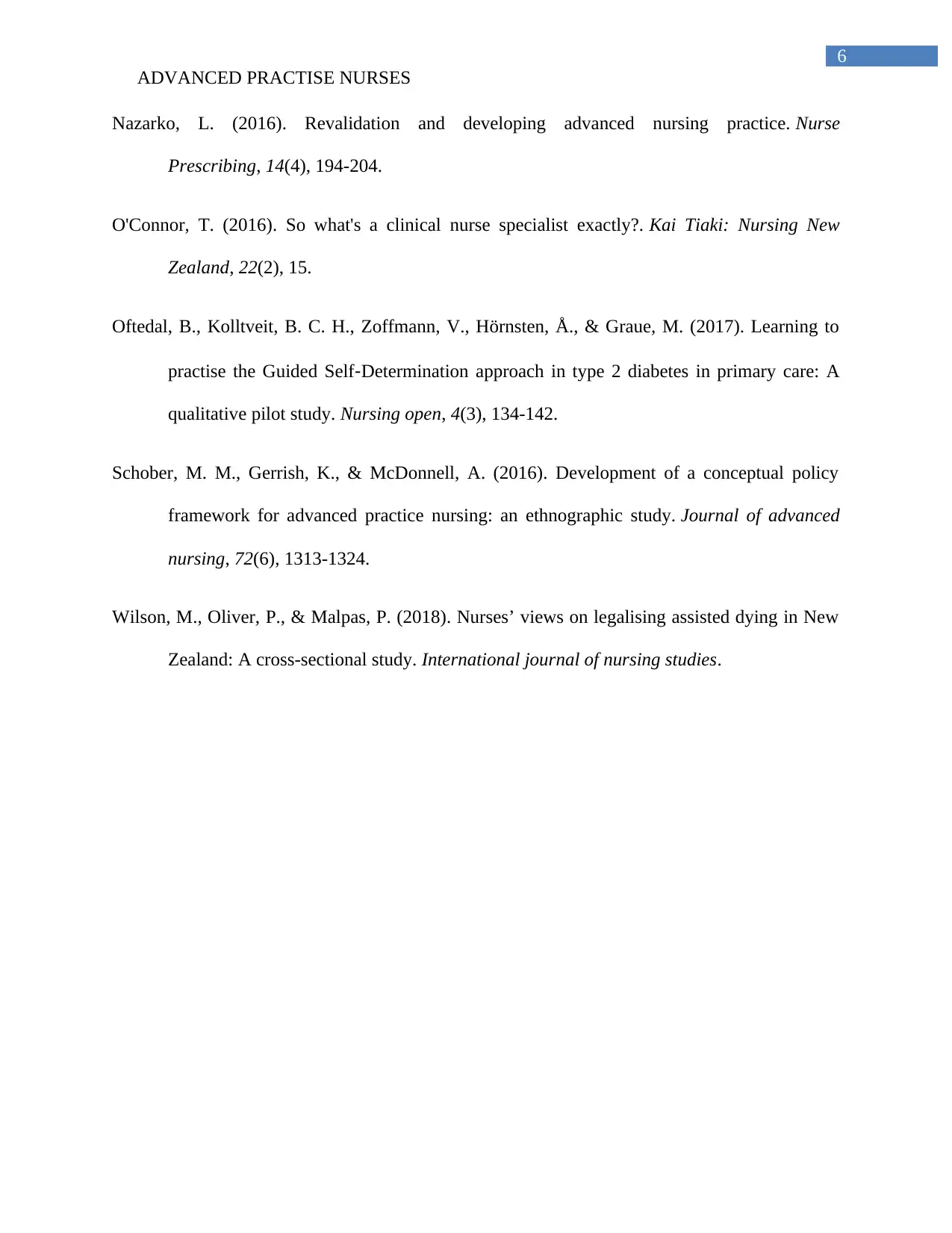
6
ADVANCED PRACTISE NURSES
Nazarko, L. (2016). Revalidation and developing advanced nursing practice. Nurse
Prescribing, 14(4), 194-204.
O'Connor, T. (2016). So what's a clinical nurse specialist exactly?. Kai Tiaki: Nursing New
Zealand, 22(2), 15.
Oftedal, B., Kolltveit, B. C. H., Zoffmann, V., Hörnsten, Å., & Graue, M. (2017). Learning to
practise the Guided Self‐Determination approach in type 2 diabetes in primary care: A
qualitative pilot study. Nursing open, 4(3), 134-142.
Schober, M. M., Gerrish, K., & McDonnell, A. (2016). Development of a conceptual policy
framework for advanced practice nursing: an ethnographic study. Journal of advanced
nursing, 72(6), 1313-1324.
Wilson, M., Oliver, P., & Malpas, P. (2018). Nurses’ views on legalising assisted dying in New
Zealand: A cross-sectional study. International journal of nursing studies.
ADVANCED PRACTISE NURSES
Nazarko, L. (2016). Revalidation and developing advanced nursing practice. Nurse
Prescribing, 14(4), 194-204.
O'Connor, T. (2016). So what's a clinical nurse specialist exactly?. Kai Tiaki: Nursing New
Zealand, 22(2), 15.
Oftedal, B., Kolltveit, B. C. H., Zoffmann, V., Hörnsten, Å., & Graue, M. (2017). Learning to
practise the Guided Self‐Determination approach in type 2 diabetes in primary care: A
qualitative pilot study. Nursing open, 4(3), 134-142.
Schober, M. M., Gerrish, K., & McDonnell, A. (2016). Development of a conceptual policy
framework for advanced practice nursing: an ethnographic study. Journal of advanced
nursing, 72(6), 1313-1324.
Wilson, M., Oliver, P., & Malpas, P. (2018). Nurses’ views on legalising assisted dying in New
Zealand: A cross-sectional study. International journal of nursing studies.
1 out of 7
Related Documents
Your All-in-One AI-Powered Toolkit for Academic Success.
+13062052269
info@desklib.com
Available 24*7 on WhatsApp / Email
![[object Object]](/_next/static/media/star-bottom.7253800d.svg)
Unlock your academic potential
Copyright © 2020–2026 A2Z Services. All Rights Reserved. Developed and managed by ZUCOL.





